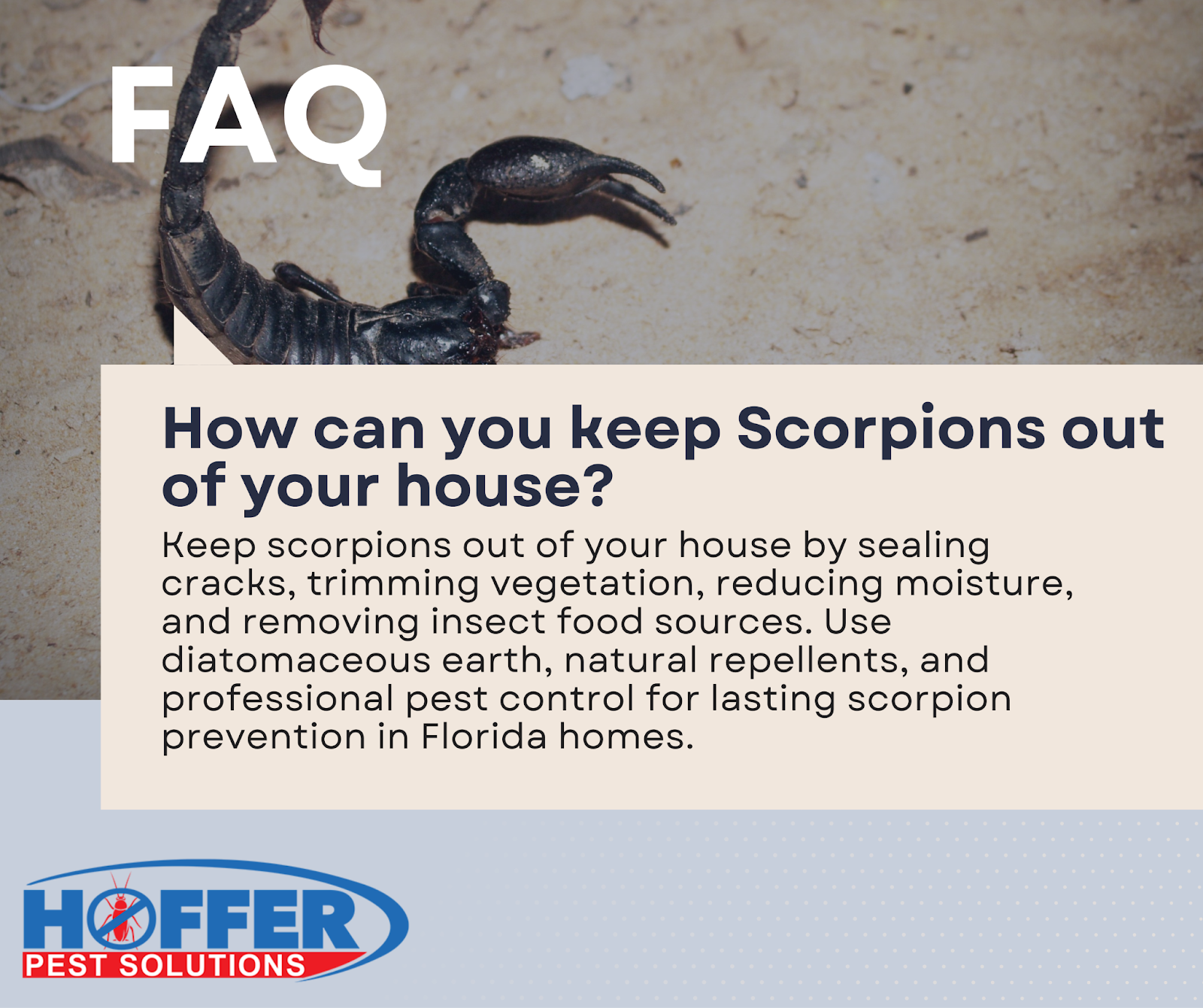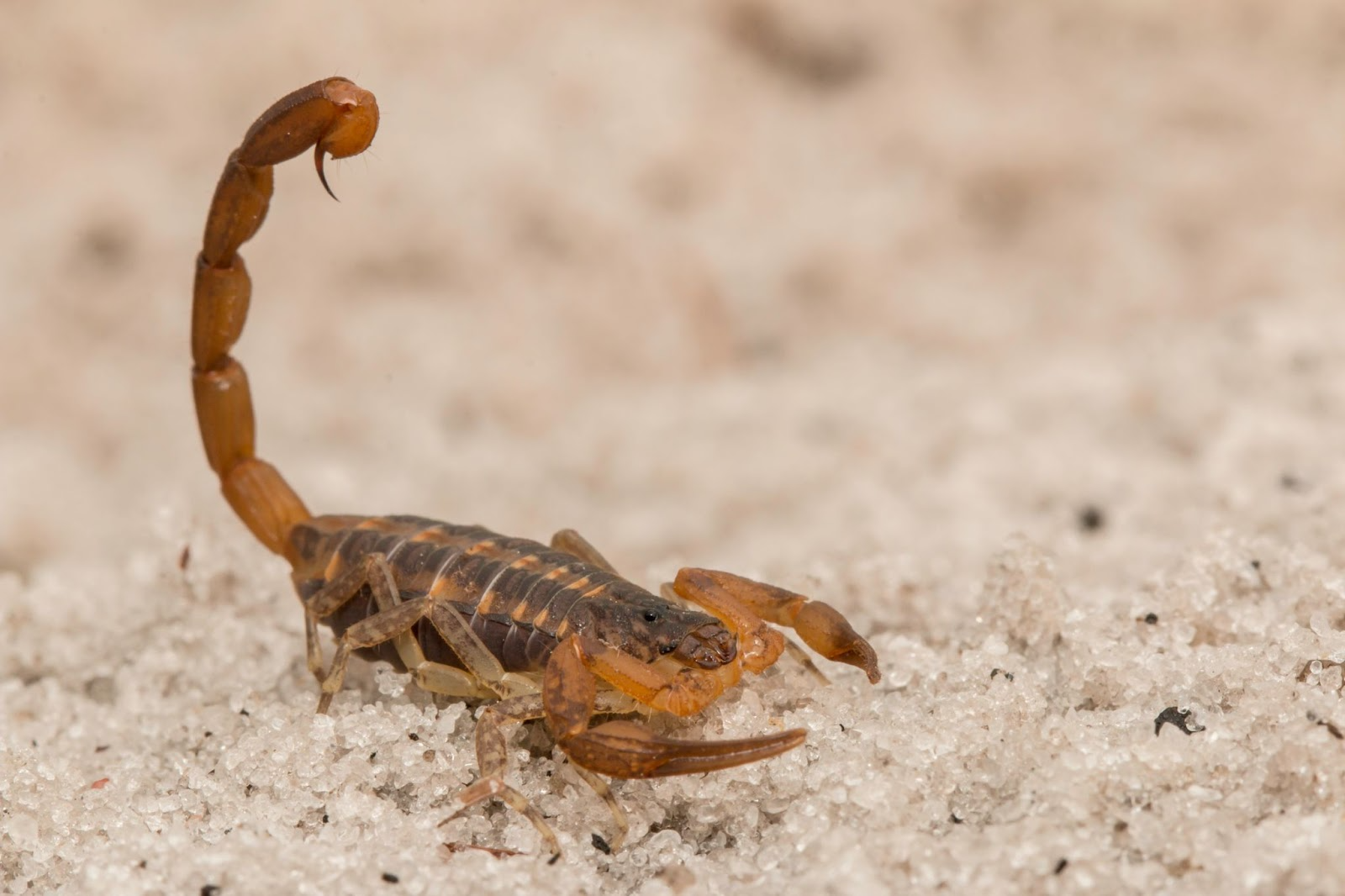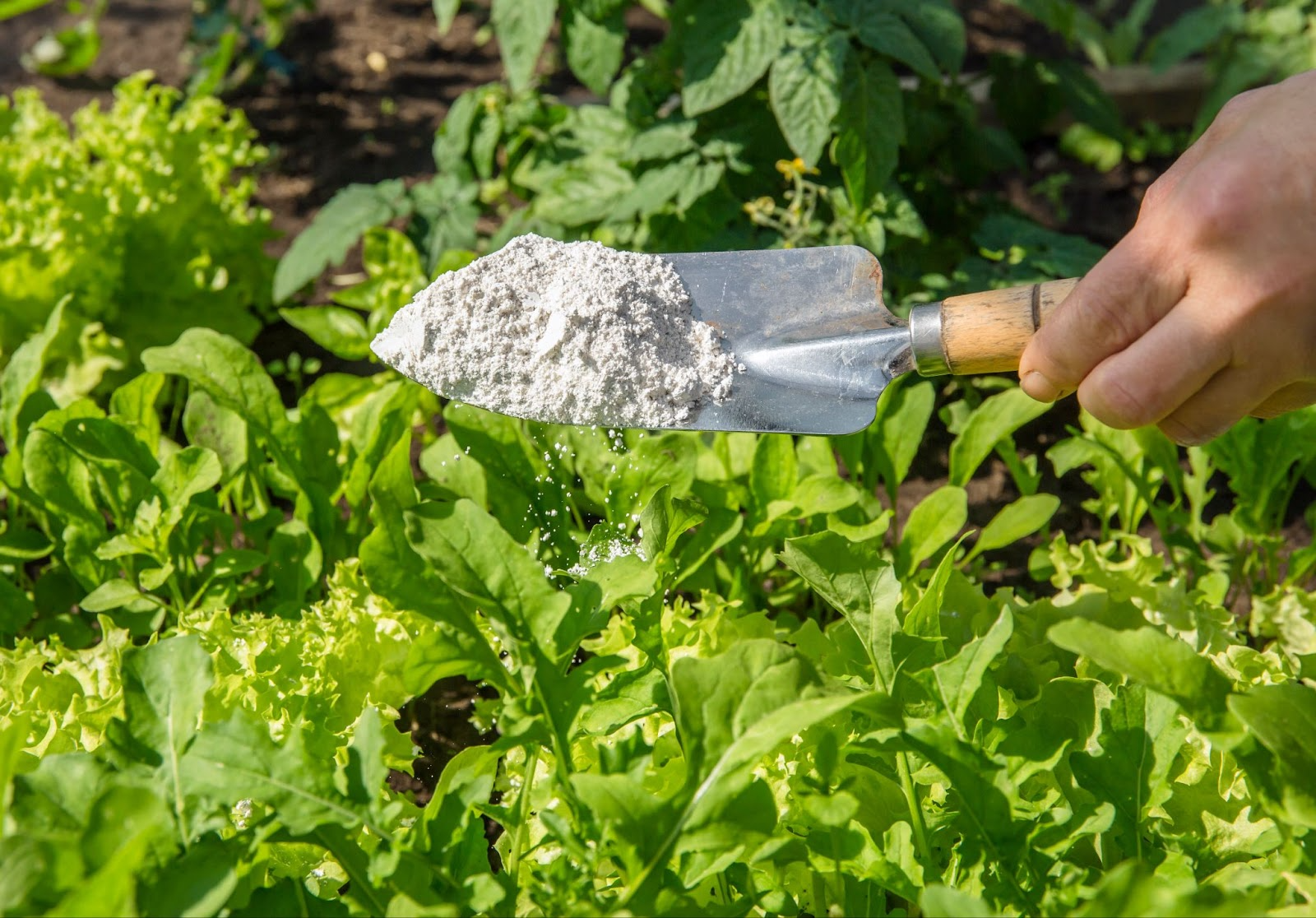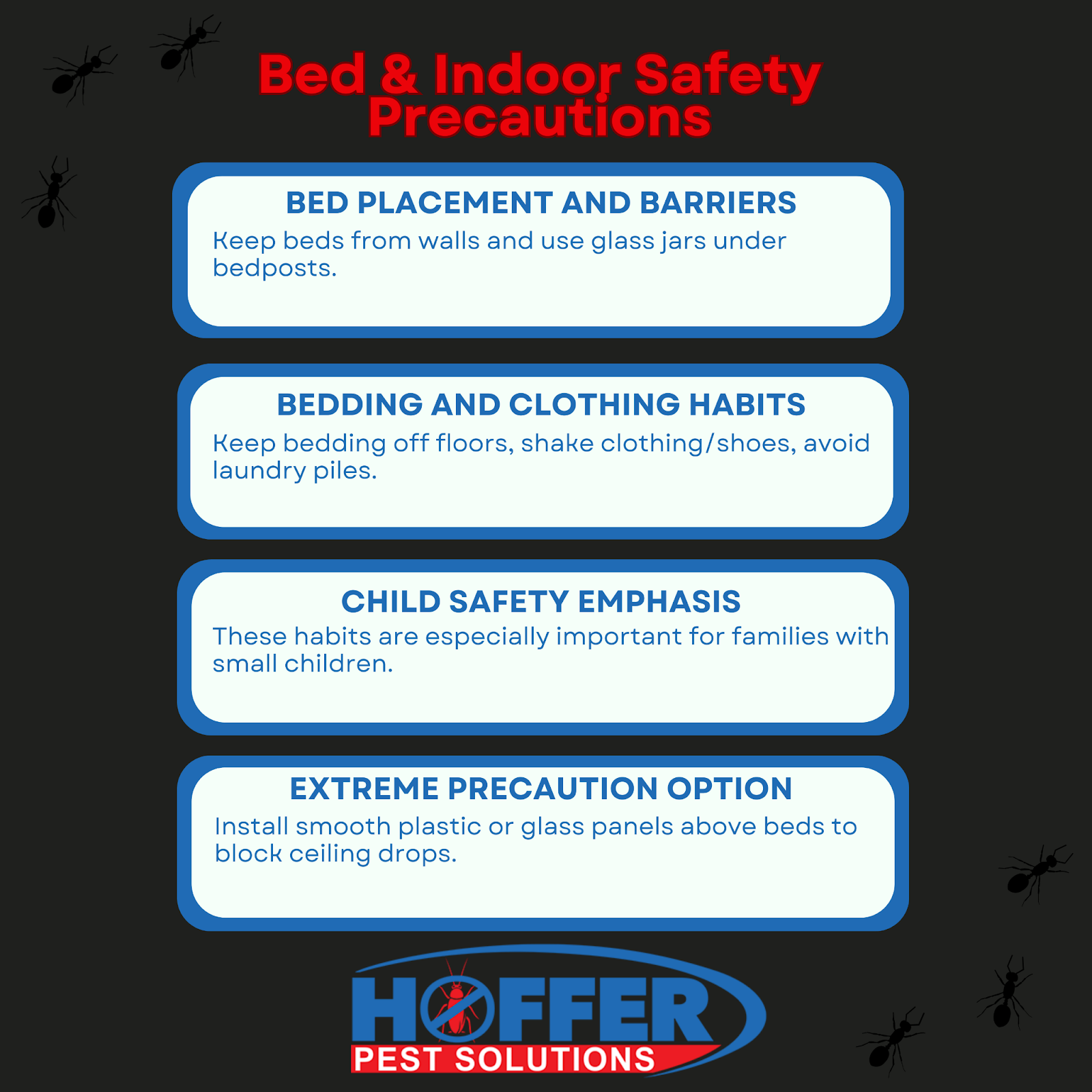Keep scorpions out of your house by sealing cracks, trimming vegetation, reducing moisture, and removing insect food sources. Use diatomaceous earth, natural repellents, and professional pest control for lasting scorpion prevention in Florida homes.

Scorpions are unsettling intruders. Their painful stings pose risks to children, pets, and anyone who encounters them inside the home. In Florida, our warm, humid climate and year-round insect activity make houses especially inviting to these pests. That’s why prevention is critical, not just for comfort, but for safety.
In this guide, you’ll learn step-by-step how to make your home less attractive to scorpions, which DIY methods actually work, and when to call in a trusted professional for lasting results.
Hoffer Pest Solutions helped Florida families stay pest-free for more than 40 years. If you want immediate relief and long-term protection, our team is here with proven solutions that keep scorpions out for good.
If you’d like the full breakdown of prevention strategies, keep reading, we’ll cover exactly what works, why it matters, and how you can take back peace of mind in your home.
Eliminate What Attracts Scorpions

Remove Food Sources
Scorpions don’t come inside to snack on your pantry, they come to hunt the pests already living with you. Roaches, crickets, spiders, and even ants all make up their diet. If your home has an existing insect problem, scorpions will follow. Managing those pests is a form of indirect scorpion control.
Structural moisture issues encourage termites and ants, which in turn invite scorpions. By keeping other insects in check with regular pest control treatments, you cut off a scorpion’s reason for moving in.
Control Moisture
Scorpions are also drawn to water. Leaky pipes, pet dishes left out overnight, condensation around AC units, and damp basements all attract them. One homeowner noted a dramatic reduction in scorpion sightings after fixing plumbing leaks and eliminating all sources of standing water. Keeping your home dry discourages scorpions and also reduces the insects they feed on.
Declutter Yard & Home
Outside, clutter is a scorpion’s best friend. Piles of leaves, stacked tiles, woodpiles against the house, and even children’s outdoor toys can harbor them. Always wear gloves and boots when handling yard debris, scorpions often lurk underneath.
Palm trees, in particular, are notorious hiding places. Loose bark and dead fronds create cool, shaded shelters where scorpions spend their days. Regularly trimming fronds and stripping old bark makes your yard less appealing. So yes, scorpions really do live in palm tree bark, and keeping those trees clean goes a long way in reducing problems near the home.
Seal Your Home Against Scorpions
DIY Sealing That Works
Even if you eliminate food and water, scorpions will still try to squeeze inside. The most effective defense is sealing their entry points. Simple tools like silicon caulk tubes can block gaps around outlets, vents, mortar joints, and eaves. This low-cost step has helped many families dramatically cut down on sightings.
Sealing Mistakes to Avoid
Not all sealing methods are safe. Blocking stucco weep holes or drip tracks, for instance, might keep pests out temporarily, but it also traps moisture inside walls. That trapped moisture can cause mold, rot, and even draw more pests later. Spray foams also carry risks, if overfilled, they can expand and damage drywall.
Professional Sealing Services
Some companies market “scorpion sealing” as a cure-all, and skepticism is understandable. The truth is, sealing absolutely works, but only when it’s done correctly. Professionals know where scorpions enter, how to block those gaps without compromising airflow, and how to integrate sealing with broader pest management. Homeowners who attempt sealing without expertise often overlook key entry points or create new problems. Call Hoffer Pest Solutions and work with a trusted local provider to ensure the job is thorough, safe, and long-lasting
Safe Barriers & Repellents

Diatomaceous Earth (DE)
Few tools are as effective and safe as food-grade diatomaceous earth. This fine powder, sprinkled in thin lines along baseboards or around foundations, creates a barrier that slices through a scorpion’s exoskeleton, dehydrating it within days. It’s non-toxic to children and pets when applied correctly, which makes it an excellent choice for families.
Not all DE is the same. Pool-grade DE is chemically treated and unsafe for indoor use. Only food-grade DE should be used in and around the home. Apply it sparingly, as heavy layers can leave permanent white marks and create unnecessary dust. A light dusting is enough to do the job.
Natural Oils & Repellents
Essential oils can also help. Cinnamon, lavender, and cedar oils are all natural repellents. Applying them in corners, along floorboards, or even on potted plants can discourage scorpions from entering.
Sticky Traps & Powders
Glue traps, commonly used for rodents, can be set near water pipes, dark corners, or baseboards to monitor activity. For added protection, powders like borax or silica gel can be puffed into wall voids, cracks, and outlets. These powders dry out scorpions’ protective coating, providing residual control long after application.
Active Scorpion Contro

Night Hunting with UV Lights
One of the most effective ways to locate scorpions is with a blacklight. Their exoskeletons glow a greenish-blue under UV light, making them easy to spot during nightly patrols. Many homeowners have reduced infestations by regularly inspecting their property after dark. When discovered, scorpions can be captured with long-handled tongs or carefully vacuumed up. Some even prefer the torch method for instant elimination, though this requires extreme caution to avoid fire hazards.
While active hunting is effective, it should complement, not replace, other prevention strategies. Without addressing food sources and entry points, you’ll be stuck chasing them night after night.
Pets as Predators
Cats and chickens are natural scorpion hunters. Chickens peck at scorpions in yards, and some cats instinctively chase and kill them indoors. However, relying solely on pets is risky. Scorpions can and do sting animals, leading to painful encounters or vet visits. For homeowners with pets, prevention through sealing and pest management remains the safer long-term strategy.
Why Scorpions Come Inside
Scorpions are nocturnal hunters. During the day they hide in cool, ark places, but at night they emerge in search of three necessities: water, food, and shelter. When they enter homes, it’s rarely by accident, they’re following those necessities.
Florida homes often draw scorpions indirectly. Our state’s moisture issues foster large populations of roaches, crickets, and ants, which happen to be scorpions’ favorite meals. Structural cracks, unsealed vents, and even tiny openings as narrow as 1/16 of an inch can serve as entry points. That’s why homeowners are often puzzled to find scorpions in closets, laundry piles, or hallways with no doors or windows nearby. In reality, the scorpions followed their prey indoors or were drawn by a water source.
Knowing these motivations is the first step toward prevention. If you remove what attracts them, you’ll see fewer scorpions inside.
Bed & Indoor Safety Precautions

Scorpions are skilled climbers, but they struggle with smooth surfaces. Homeowners can use this to their advantage. Keeping beds two to three inches away from walls prevents scorpions from crawling directly onto mattresses. Placing glass jars under bedposts creates barriers they cannot climb.
It’s also wise to keep all bedding off the floor, shake out clothing and shoes before wearing them, and avoid leaving laundry piles unattended. For families with small children, these habits are especially significant to reduce nighttime risks. In extreme cases, installing a smooth plastic or glass panel suspended above the bed can prevent scorpions from dropping from ceilings, a trick many desert-region families swear by.
By combining these measures, families can sleep with far greater peace of mind.
DIY vs. Professional Scorpion Control in Florida
DIY methods can work for minor scorpion issues. Diatomaceous earth, sealing small cracks, setting sticky traps, and conducting UV patrols all provide relief. But scorpions are remarkably resilient. Unlike roaches or ants, most over-the-counter sprays won’t faze them, and infestations inside walls or attics are nearly impossible to reach without professional equipment.
Professional services go beyond quick fixes. A licensed team doesn’t just kill the scorpions you see, they eliminate the prey insects scorpions feed on, seal hidden entry points without damaging structures, and apply targeted treatments that remain safe for kids and pets. With an integrated pest management approach, professionals create lasting protection rather than a temporary reprieve.
When to Call Hoffer Pest Solutions

Scorpions may not be Florida’s most common pest, but when they appear, they demand action. Here in South Florida, year-round warmth means pests never truly go dormant. That’s why prevention is as significant as treatment.
Hoffer Pest Solutions has been protecting homes and families for more than 40 years. As a family-owned company, we live in the same communities we serve, and we understand the local conditions that make scorpions and other pests a recurring challenge. Our technicians are trained to identify the structural entry points most homeowners miss, eliminate scorpions’ food supply, and apply eco-friendly treatments designed with your family and pets in mind.
We also know that when you see a scorpion, you don’t want to wait. That’s why we offer same-day service if you call before noon. Our commitment is to provide peace of mind quickly, effectively, and safely.
Don’t lose sleep wondering if the next scorpion is under the bed, in yourchild’s closet, or near your pet’s food dish. Let our team put an end to that worry. Call Hoffer Pest Solutions today and discover why so many Florida families trust us for year-round pest protection.
Frequently Asked Questions (FAQ)
Does house “scorpion sealing” really work?
Yes, when done correctly. Sealing prevents scorpions from slipping through cracks as small as 1/16 of an inch. The key is sealing without blocking ventilation points like stucco weep holes. Professional sealing ensures long-term success without causing structural issues.
What type of diatomaceous earth is safe to use?
Only food-grade diatomaceous earth should be used in and around homes. Pool-grade DE is chemically treated and unsafe for people or pets. A light dusting of food-grade DE along baseboards or foundations creates an effective, pet-safe barrier.
Can expanding spray foam be used to block scorpion entry points?
Spray foam can help fill gaps, but overfilling can damage drywall or trap moisture. For long-term results, use foam sparingly and pair it with caulk or professional sealing to cover larger cracks safely.
Should I focus on hunting scorpions outside or just sealing my home?
Both approaches matter. Nightly UV inspections can reduce populations outdoors, but sealing and pest prevention indoors are critical to stopping new scorpions from getting inside in the first place.
Are pets like cats or chickens reliable for scorpion control?
While some cats and chickens do hunt scorpions, it’s not a foolproof solution. Pets can still be stung, so they shouldn’t be your only line of defense. A prevention plan focused on sealing and pest management is safer for your pets and family.


